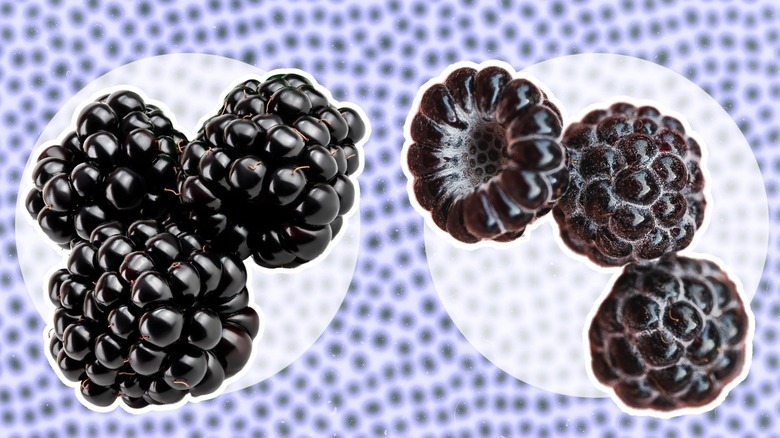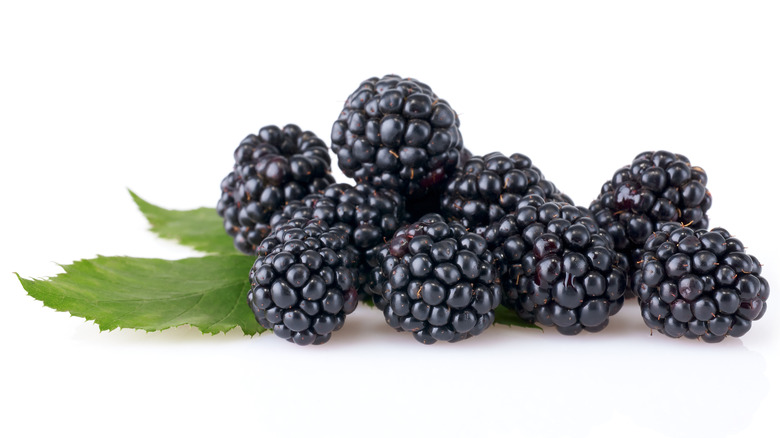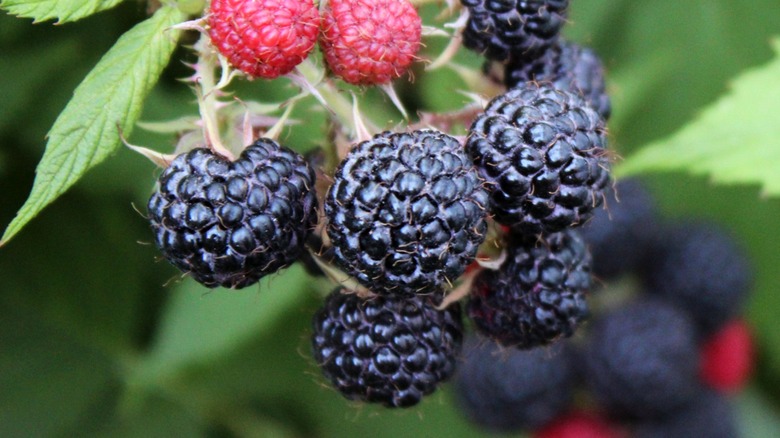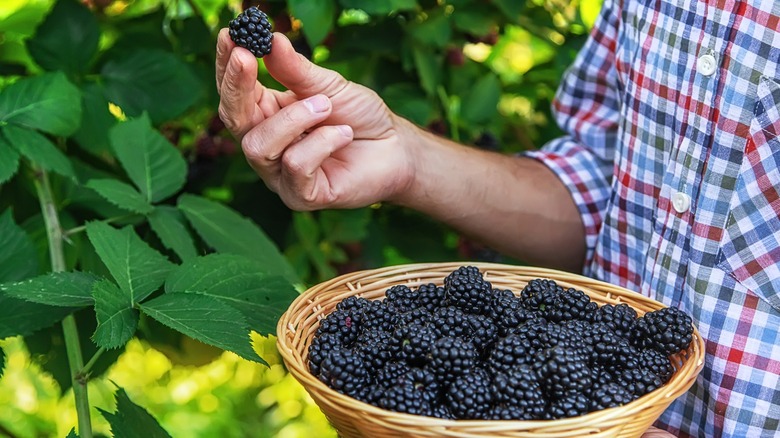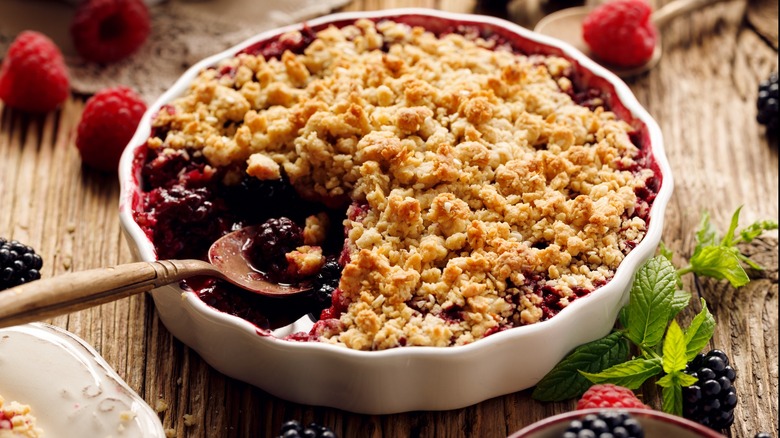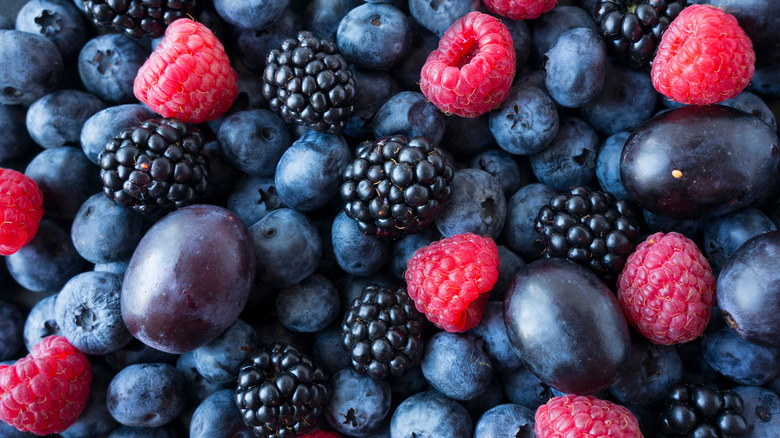Blackberries Vs Black Raspberries: What's The Difference?
Even if we can't recite the dictionary definition of a berry, we'd know one when we see one, right? Well, as it turns out, that may not be the case. Brittanica defines a berry as "a simple fleshy fruit that usually has many seeds, such as the banana, grape, and tomato." The entry for berries goes on to explain that "berry" is often used in a more general sense to describe any small edible fruit, but that raspberries, strawberries, and blackberries aren't actually berries at all.
It's a bit confusing, especially when the very name of a "blackberry" insinuates that it is, indeed, a berry. When you make a Southern blackberry cobbler or a raspberry sorbet, what are you using if not a berry? In reality, blackberries and raspberries are technically aggregate fruits, meaning a cluster of smaller fruits known as drupelets. Each of those tiny, individual sections of a blackberry or raspberry is actually its own little fruit, and Mother Nature has conveniently packaged a bunch of them together for us to devour.
By contrast, other fruits, such as blueberries and grapes, come from a single ovary and are considered true botanical berries. Within the group of aggregate cluster berries, even those with very similar names and appearances, quite a few variations exist. And that brings us to the burning question: What, exactly, is the difference between a blackberry and a black raspberry? We're glad you asked!
What are blackberries?
The wild blackberry, scientifically known as Rubus fruticosus, is classified by the Centre for Agriculture and Bioscience International (CABI) as an invasive species. In the United States, it's included on the federal list of noxious weeds. Many species of blackberry grow wild across the country (some native, some highly invasive), but interestingly enough, they're also widely cultivated as commercial crops. That's likely because the berries are so darn delicious.
Blackberry bushes are typically covered in prickles — what we commonly call thorns — though thornless varieties have been developed. Their fruits grow year-round in the United States, with a peak season in the summer. When ripe, blackberries are a combination of sweet, tart, succulent, and juicy, with a tinge of earthiness. They can be eaten raw or in a variety of cooked applications, and blackberry recipes abound, from pies and cobblers to decadent sauces, both sweet and savory.
If you see black or deep-purple aggregate berries in a grocery store, they're almost certainly blackberries rather than black raspberries, especially in the summer when blackberries are most plentiful. Though both are part of the Rubus genus, also known as bramble plants, black raspberries are far less common.
What are black raspberries?
The black raspberry appears confusingly identical to the blackberry. However, it has its own classification of Rubus occidentalis, and its own flavor, characteristics, and growing season. These berries, also known as blackcaps, bear's eye raspberries, wild raspberries, or thimbleberries, tend to thrive in cooler climates such as the Pacific Northwestern states of the U.S. They have a short growing and harvest season and are typically available for around three weeks in mid-summer.
Though they are indeed raspberries, the black raspberry has a concentrated, intense flavor. They grow on woody stems with a root system of canes, giving rise to the name caneberry plants. The resulting berries harbor earthy, wood-like flavor notes, unlike other fruits or even other types of raspberries. They are also sweeter than both other raspberries and blackberries, meaning they are easy to toss into fruit bowls, salads, smoothies, cobblers, and pies, like this raspberry pie. They complement nuts and cheeses, and with a little reduction effort, they make an excellent syrup or sauce for pancakes and frozen desserts.
Blackberries are big, glossy, and easy to grow
When viewing blackberries on their own, perching prettily on display shelves or in farmer's market bins, they may appear small and delicate. But in comparison to their black raspberry counterparts, blackberries are relatively large. Their glossy black sections are smoother, cradling a soft, edible green or white core. Like most berries, blackberries are fairly fragile and need extra care to maintain their freshness when storing. They still tend to be sturdier than the look-alike black raspberries.
Blackberries are generally available year-round in the United States, but they overflow in the summer season. They're especially prevalent in July and August, and often keep fruiting into early autumn, depending on the particular cultivar. That's in sharp contrast to the blip of time black raspberries make their appearances every year.
Blackberries have a huge culinary fan base, getting snatched up by countless consumers. And it's not just because of all that fresh goodness. They're easy to grow, especially in temperate climates with well-drained soil. That applies to home garden varieties, those used in commercial production, and even roadside ramblings. Many a family can be seen picking fresh blackberries growing wild, free, and plentiful, guarded only by those pesky, thick thorns.
Black raspberries are small, matte, and rare
The black raspberry is relatively rare. Black raspberries, which are commercially grown primarily in Oregon, have a very short season of just a few weeks in the summer, and the berries are both fragile and very perishable. Black raspberry bushes don't have a very big yield, and they don't last many seasons. The sheen of black raspberries tends to be matte, rather than glossy black, and you may find some irregular red pigmentation. Many also have a harmless white "bloom" that can be wiped off and doesn't affect the flavor.
These berries are much smaller than blackberries; they can be less than half an inch in diameter, or sometimes up to three-quarters of an inch. The other big difference from the blackberry is that the black raspberry, like all raspberries, is hollow in the center. This comes from the berries being separated from the stem when they're picked.
Though both types of berries are delicate, black raspberries are even more perishable, partially because of having that hollow core. They typically last only a day or two after harvesting. All of this makes them quite elusive. So, why would anyone bother to grow them? For starters, they're ridiculously tasty. And that's not even counting the nutrition blast common to many types of berries, including this little outlier.
Nutrition profiles of blackberries and black raspberries
Berries are widely known to veer into superfood territory, and these two beauties march proudly with the pack. They hold very similar nutritional values, and both blackberries and black raspberries are packed full of vitamins, dietary fiber, minerals, antioxidants, and flavonoids. Both also carry beneficial amounts of vitamin C, which can help strengthen the immune system and benefit connective tissue. Fiber, meanwhile, can aid in regulating the digestive tract and blood sugar levels.
One of the most fascinating benefits of both these berries hides within the skin and flesh. It's a group of pigments known as anthocyanins, which are responsible for the fruits' rich dark-purple and blackish hues. Anthocyanins are known to encourage healthy blood vessels and have the potential to thwart cell mutations that could become cancerous. They're also known to have antioxidative and antimicrobial properties, and have even been used traditionally as a form of natural food dye. In fact, the USDA reportedly once stamped meat products using ink from black raspberries.
Though these power-packed berries snatch the spotlight in summer, you can still enjoy them for months afterward. While storing berries like blackberries and raspberries can be a challenge, they both freeze well and can retain flavor and texture for up to six months in the freezer, with little or no added preservation techniques.
